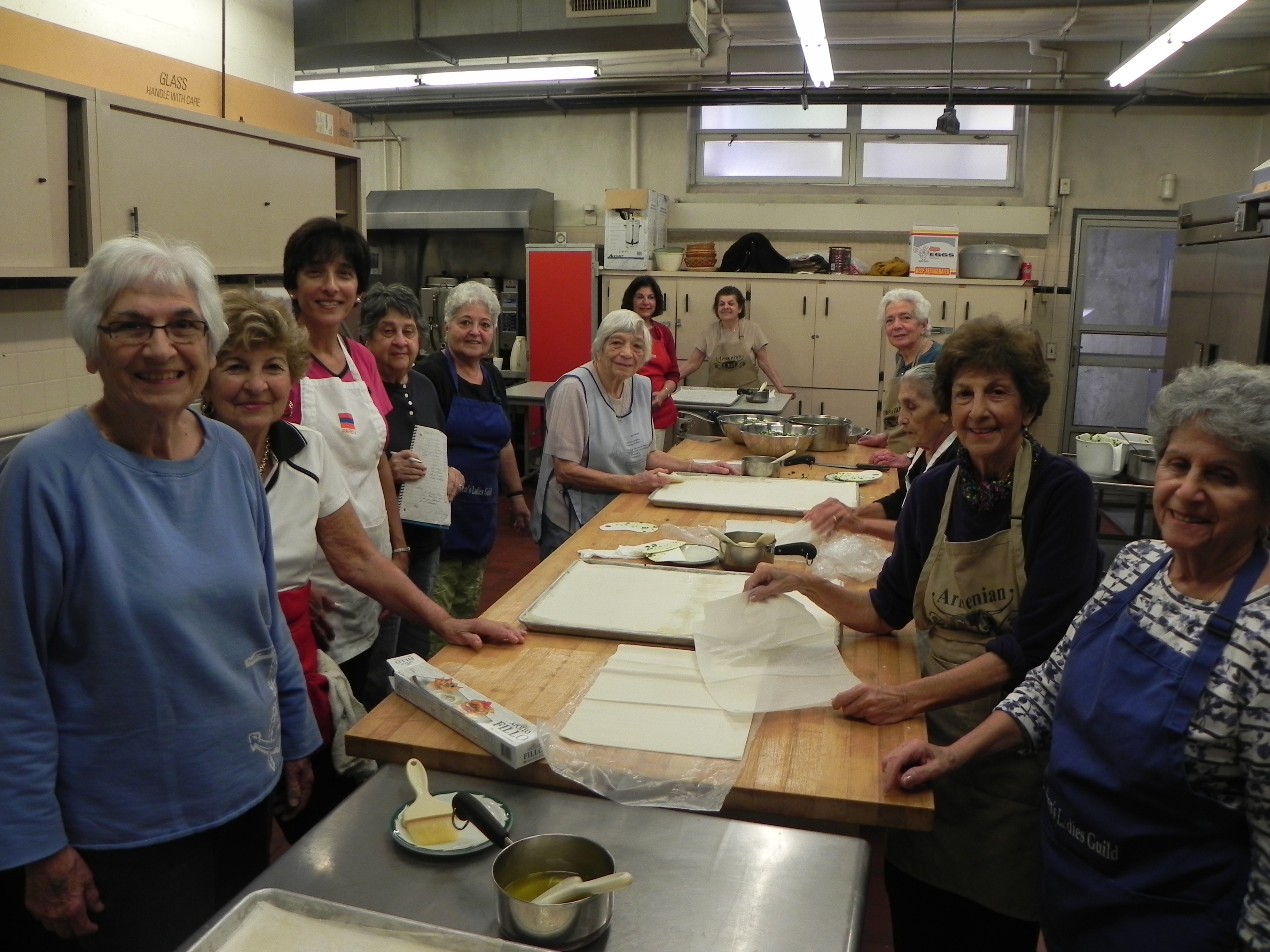Several feet below the sacred altar of St. Stephen’s Armenian Apostolic Church, there is a kitchen unlike any other. This one is bustling with dozens of hardworking Armenian women, laughing and catching up about family life and the latest in the community while preparing pounds of gourmet Armenian food and trays of desserts for the annual church bazaar.
These women are the beating heart of this Watertown church. Many make up the Ladies Guild, a collective established in 1953 whose fundraising efforts allowed for the consecration of the church in 1957. What once started as a small but mighty group of women has now become a selfless, humble and friendly group with over 100 members, including wife of the late priest Der Torkom, Zevart Hagopian. “You can’t keep up with her,” says Linda Kechejian of the 81-year-old Yeretzgin.
But preparing for the church’s largest fundraiser of the year is not exclusive to the Ladies Guild. All volunteers are invited to help, and when it comes to the bazaar, these women waste no time.
Their work preparing for the early-November bazaar begins in the middle of summer; Tuesdays are dedicated to pastries and Wednesdays, to gourmet items. The menu is impressive, consisting of exactly what you would expect from homemade Armenian fare: mantuh, two kinds of boureg, kadayif, choreg, sarma, kufteh and baklava—staples of the Western Armenian diet ready to be sold to at least one-thousand Armenians and non-Armenians alike.
Cheese boureg, the ladies confess, is the most difficult, in fact, “the worst” to prepare because it requires a number of steps. The flaky dough, for example, must be made from scratch. This year, the group prepared at least 2,000 of them.
As for the easiest recipe? A resounding “Nothing!” ensues, followed by laughter, but quickly succeeded by Yeretzgin Hagopian: “Choreg, maybe? Because it’s not complicated.” Leave it to her to identify the single ‘easy’ dish.
But these Armenian favorites would be bland (“anham,” if you will) were it not for the women themselves, and a very important ingredient: love. Deanne Nahabedian has committed so much of her life to the church, it seems she knows this underground kitchen better than her own. “That’s what happens when you hit 51 years. You know where everything goes,” she says, as she leads a Tuesday morning session dedicated to spinach boureg (one which, it’s worth noting, requires 19 pounds of chopped spinach, 10 pounds of muenster cheese and 75 eggs).
 Watching over the group is a large black and white framed photograph of the starting seven—“aracheener” as they’re endearingly called. “We’re the worker bees. They were the leaders,” recalls Kechejian of these legendary women, which included Makrouhi Guzelian, Makrouhi Nahabedian, Clara Russian, Araxy Ayvazian, Margaret Kaloosdian, Mary Peroonian, and Anahid Changelian.
Watching over the group is a large black and white framed photograph of the starting seven—“aracheener” as they’re endearingly called. “We’re the worker bees. They were the leaders,” recalls Kechejian of these legendary women, which included Makrouhi Guzelian, Makrouhi Nahabedian, Clara Russian, Araxy Ayvazian, Margaret Kaloosdian, Mary Peroonian, and Anahid Changelian.
these Armenian favorites would be bland (“anham,” if you will) were it not for the women themselves
Changelian, who used to work for the Hairenik back when it was on Stuart Street when she was 16 years old, also served on the first executive board for the Ladies Guild. “It’s a great organization. The women are all devoted,” she says while delicately folding pieces of manteh. “This group is very lucky to do what we do for the church.”
Sharing a workspace with Changelian that Wednesday morning and helping in the preparation of that day’s quota of 30 pounds of manteh was Sandra Narinian. A lifelong supporter of the church, Narinian says preparation for the annual bazaar is far more meaningful because it brings Armenians together. “Technically, we could all write a $1,000 check each year and not do the bazaar and the oil will go in the tank and the lights will go on,” she explains. “But where would be the fellowship and the fun of doing that? That’s not the way it works.”
“It gives the ladies some sense of belonging,” says Lucy Guzelian, daughter-in-law of the late Makrouhi Guzelian. In an emotional reflection on the women who came before her, she says “it’s a way to get together and honor our parents, grandparents. We are bringing up our children to do the same.”
Many of the other women share that sentiment and hope that younger generations will carry on these special traditions and recipes. They look forward to the idea “that young people will see this work and be motivated to continue it,” says Mary Demirjian in Armenian. “In turn, we will be proud of this next generation, that we passed down something meaningful to them.”
St. Stephen’s Armenian Apostolic Church will be hosting its 62nd annual bazaar this Friday and Saturday. In years past, there has been so much prepared food on the table, it’s been difficult to see the tablecloth underneath. Armenians call that “arad jash,” an overabundance of food. And these ladies definitely surpass that cultural expectation. An undoubtedly blessed group of hardworking women, it’s a miracle they pull it off every year.




U guys&girls are all our present & future without u there is no bazaar .keep the good bazaar days going. You wonderful Armenians .all Over Armenian American Churches Bazaars.come & enjoy .
Wonderful article on the women whe send an important message and spend months selflessly preparing. Telling something about preparing the savory foods shown in the last picture, and the women who come, would have created a balance. Leeza covered them as well. They have amazing stats about the food. Was it a lack of space? Many of them are Ladies Guild, many ARS, and even some from sister churches. Bravo to all the women who work from July to November to make the bazaar what it is.
Simply amazing